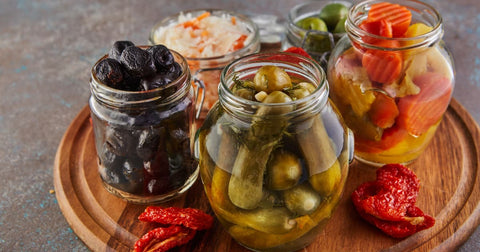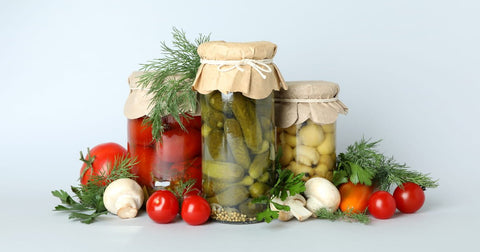Pickles – the tangy, crunchy snacks we love on burgers, sandwiches, or even straight from the jar. But did you know that not all pickles are created equal? Some are fermented, while others are simply pickled. This distinction is crucial when it comes to the health benefits of pickles, especially for your gut.

Are Pickles Fermented? Decoding the Difference
The answer is: it depends. There are two main ways to make pickles:
- Fermentation: This traditional method involves soaking cucumbers in a salt brine, allowing naturally occurring bacteria to convert sugars into lactic acid. This process creates probiotics, the "good" bacteria that benefit your gut health.
- Pickling: This quicker method involves soaking cucumbers in vinegar, which acts as a preservative but doesn't promote the growth of probiotics.
Do Pickles Have Probiotics? The Gut-Friendly Advantage

Fermented pickles, also known as lacto-fermented pickles, are a rich source of probiotics. These beneficial bacteria can:
- Improve digestion: Probiotics help break down food, enhancing nutrient absorption and reducing digestive discomfort.
- Boost immunity: A healthy gut microbiome is crucial for a strong immune system.
- Reduce inflammation: Some probiotic strains have anti-inflammatory effects, potentially benefiting conditions like irritable bowel syndrome (IBS).
Are Pickles Good for Gut Health? The Science Behind the Crunch
The gut microbiome, a complex community of trillions of microorganisms, plays a crucial role in overall health. Research suggests that consuming probiotic-rich foods like fermented pickles can contribute to a balanced gut microbiome, leading to improved digestion, stronger immunity, and even better mental health.
Are Dill Pickles Good for You? Sorting Through the Options

Dill pickles are a popular variety, but their probiotic content depends on how they're made.
- Fermented Dill Pickles: These are brined in salt and water, allowing for probiotic fermentation. They offer the gut health benefits mentioned above.
- Vinegar Dill Pickles: These are pickled in vinegar, which kills the probiotics. While still tasty, they lack the same gut-boosting properties.
To reap the probiotic benefits, choose fermented dill pickles, usually found in the refrigerated section of your grocery store.
Food Intolerances and Pickles: Proceed with Caution
While pickles can be a healthy addition to your diet, some people may experience digestive issues due to food intolerances or sensitivities.
If you suspect a food intolerance is contributing to your discomfort, a food sensitivity test can help you pinpoint the culprits and make informed dietary choices.
Key Takeaways
- Not all pickles are fermented; look for "lacto-fermented" or "naturally fermented" on the label.
- Fermented pickles are a source of probiotics that benefit your gut health.
- Choose fermented dill pickles over vinegar dill pickles for probiotic benefits.
- If you experience digestive discomfort after eating pickles, consider a food sensitivity test to rule out intolerances.

Pickles can be a delicious and healthy snack, but it's important to choose wisely. By opting for fermented varieties, you'll not only satisfy your taste buds but also nourish your gut microbiome.
Remember: A healthy gut is the foundation of overall wellness. So go ahead and enjoy those fermented pickles!
Frequently Asked Questions:
1. Are all pickles fermented?
No, not all pickles are fermented. Some pickles are made using vinegar, which acts as a preservative but doesn't produce probiotics. Look for "lacto-fermented" or "naturally fermented" on the label to ensure you're getting probiotic-rich pickles.
2. Can I make my own fermented pickles at home?
Yes, making fermented pickles at home is relatively simple. You'll need cucumbers, salt, water, and a jar. There are numerous online resources and recipes available for guidance.
3. How many pickles should I eat to benefit my gut health?
There's no set amount, but incorporating a few fermented pickles into your diet regularly, such as a small serving alongside a meal, can contribute to a healthy gut.
4. Can pickles help with weight loss?
Pickles are low in calories and high in fiber, which can promote feelings of fullness and aid in weight management. However, it's important to choose low-sodium varieties and consume them as part of a balanced diet.
5. Are there any risks associated with eating fermented pickles?
Fermented pickles are generally safe for most people. However, those with high blood pressure should be mindful of sodium intake. Additionally, individuals with histamine intolerance might experience adverse reactions.


.png?v=1737390083)
.png?v=1737187409)


